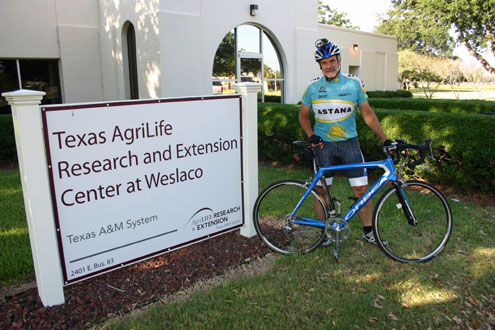McALLEN – Salvador Alemany commutes from his home in McAllen to his office in Weslaco and back.
Not a big deal, but Alemany does it on a bicycle. And he takes the long way home, pedaling some 60 miles per day, four days a week.
He’s been doing it for three years, ever since he began his job at the Texas AgriLife Research and Extension Center at Weslaco as an urban forester with the Texas Forest Service.
“I do it for several reasons,” said Alemany, a native of San Juan, Puerto Rico. “First, because we only had one car and my wife needed it. Second, I was overweight and had high blood pressure. I don’t like to take medication, so I started bicycling to work.”
He leaves his home around 5:30 a.m. to avoid school traffic, and often arrives home after dark, he said.
“Riding my bicycle to work solved both problems,” Alemany said. “I save a lot of money by not driving to work, and my health improved. My blood pressure is normal and my weight stabilized. I’ve lost 40 pounds.”

Salvador Alemany, a Texas Forest Service urban forester in Weslaco, is in training to cycle in the STIHL Tour des Trees in Oregon in October to raise funds tree research, education and scholarships. (Texas AgriLife photo by Rod Santa Ana)
Alemany sees a natural connection between cycling and his profession, urban forestry.
“Both trees and cycling can improve the quality of life in an urban setting,” he said. “Trees provide a long list of benefits, including providing relief from the heat. They make activities, including cycling, more comfortable. And cycling can reduce the rate of obesity, which is a very serious problem here in South Texas.”
Alemany is not the first to make the connection. In 1992, cyclists in Seattle started a tree fund to raise money for tree research and education programs.
“That led to the creation of the STIHL Tour des Trees, the signature fundraising event of the Tree Research and Education Endowment Fund, or TREE Fund,” he said. “So far, they’ve raised more than $5 million.”
Alemany will compete in the STIHL Tour des Trees later this year, a 585-mile bicycle trek through the mountains near Portland, Ore.
“This will be the 20th anniversary of the Tour des Trees,” Alemany said. “It’ll be held for six days, from Oct. 5-11. Each rider must raise $3,500 in donations. I am fortunate to be one of only 101 riders that will take part. We will be riding, rain or shine, and we’re expected to raise a total of $3.5 million.”
To donate to his ride, Alemany asks that contributors visit the tour’s website at www.stihltourdestrees.org, or contact him at 956-969-5654.
“The tree fund finances scholarships and research nationwide to study the science, economics and social values of trees,” he said. “Studies are done on everything from protecting trees from insects and diseases to developing methods of assessing value to trees in an urban setting.”
Based on such research, Alemany said that street trees in McAllen, for example, have an economic value of $9 million annually to its citizens.
“They increase our property values,” he said. “Trees keep our homes cooler and lower our air conditioning bills. They reduce storm runoff when tree roots soak up water. They purify our air, provide carbon sequestration, they even keep shoppers cool downtown, which encourages them to stay longer and shop more.”